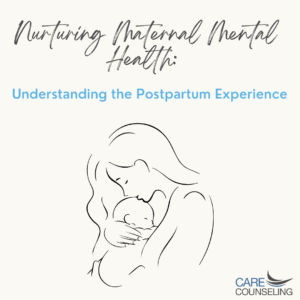 The journey of motherhood is a profound and transformative experience. From the moment a baby is born, a mother’s life is forever changed. While the postpartum period is often portrayed as a time of joy and bonding, it can also be accompanied by significant mental health challenges. We will explore the postpartum experience, specifically focusing on maternal mental health and the importance of seeking support during this critical time.
The journey of motherhood is a profound and transformative experience. From the moment a baby is born, a mother’s life is forever changed. While the postpartum period is often portrayed as a time of joy and bonding, it can also be accompanied by significant mental health challenges. We will explore the postpartum experience, specifically focusing on maternal mental health and the importance of seeking support during this critical time.
The Emotional Roller Coaster
The postpartum period is characterized by a whirlwind of emotions. While many new mothers experience feelings of happiness and fulfillment, it is not uncommon to also encounter feelings of sadness, anxiety, and overwhelm. This emotional roller coaster is often attributed to hormonal changes, sleep deprivation, physical recovery, and the adjustment to a new role.
Postpartum Depression: Shattering the Myth of the “Baby Blues”
One mental health condition that can significantly impact mothers is postpartum depression (PPD). PPD affects approximately 1 in 7 women, and it goes beyond the transient “baby blues” that many new mothers experience. PPD is characterized by persistent feelings of sadness, hopelessness, fatigue, and a loss of interest in activities. It can interfere with a mother’s ability to bond with her baby and take care of herself.
The Importance of Support and Understanding
Recognizing the signs and symptoms of PPD is crucial for early intervention. However, it is equally important for society to foster a supportive and understanding environment for new mothers. By offering empathy, validation, and non-judgmental support, we can help break the stigma surrounding maternal mental health and encourage women to seek help when needed.
Postpartum Anxiety: The Overwhelming Worries
In addition to depression, postpartum anxiety is another common mental health challenge. New mothers often experience excessive worry and fear, sometimes to the point of panic attacks. The pressure to be a perfect parent, concerns about the baby’s well-being, and overwhelming responsibilities can contribute to postpartum anxiety. It is essential to recognize that anxiety is not a reflection of a mother’s capabilities or love for her child but rather a treatable condition that requires support and treatment.
Postpartum Psychosis: A Rare but Serious Condition
While relatively rare, postpartum psychosis is a severe mental health condition that requires immediate medical attention. It usually occurs within the first few weeks after childbirth and is characterized by hallucinations, delusions, disorientation, and extreme mood swings. Mothers experiencing postpartum psychosis are at risk of harming themselves or their infants. Prompt intervention and a comprehensive treatment plan involving medical professionals are essential for ensuring the safety and well-being of the mother and baby.
The Role of Postpartum Support Centers
Recognizing the unique challenges faced by new mothers, postpartum support centers have emerged as invaluable resources for maternal mental health. These centers provide a safe and nurturing environment where women can access specialized care, education, and support tailored to their needs.
- Professional Guidance: Postpartum support centers typically have experienced mental health professionals who specialize in perinatal care. They offer individual counseling sessions, group therapy, and parenting classes to address the various mental health concerns new mothers may face.
- Peer Support: Connecting with other women going through similar experiences can be immensely comforting. Postpartum support centers often facilitate peer support groups where mothers can share their stories, exchange advice, and find solace in knowing they are not alone.
- Educational Workshops: Understanding the postpartum experience, including the changes in hormones, sleep patterns, and relationships, can help new mothers navigate this transformative phase. Postpartum support centers frequently organize educational workshops and seminars to provide information and equip women with the knowledge they need to care for themselves and their babies.
- Holistic Approaches: Many postpartum support centers recognize the importance of holistic approaches to maternal mental health. They may offer services such as yoga classes, mindfulness, meditation, and alternative therapies like acupuncture or massage to promote overall well-being and relaxation
The postpartum period is a time of immense joy, but it can also present significant mental health challenges. By prioritizing maternal mental health and fostering a supportive environment, we can ensure that every new mother receives the care and understanding they deserve. Postpartum support enters play a crucial role in this journey, offering a comprehensive range of services to promote the well-being of both mothers and their babies. Remember, seeking help is a sign of strength, and no mother should face the challenges of the post partum experience alone.
We’re Here to help
Our wellness experts will be happy to take care of you. You can CLICK HERE to schedule an appointment now or call (612)223-8898.
Meet Clinicians
We’re united by our commitment to providing effective, relevant, and innovative mental health support at all stages of your journey. Click Here to find a therapist or find out more about who we are, where we come from, and how we live out CARE’s mission every day.
The professionals at CARE are actively collecting and creating resources to help with what you need and address frequently asked questions. We’re Here for You.



